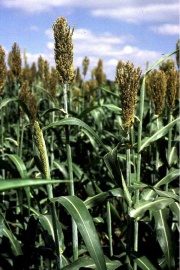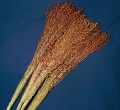Difference between revisions of "Broomcorn"
Jump to navigation
Jump to search
(username removed) |
m (Text replace - "== Authority ==" to "== Sources Checked for Data in Record ==") |
||
| Line 18: | Line 18: | ||
| − | == | + | == Sources Checked for Data in Record == |
* ''Encyclopedia Britannica'', http://www.britannica.com Comment: "broomcorn" Encyclopædia Britannica [Accessed April 8, 2002]. .. | * ''Encyclopedia Britannica'', http://www.britannica.com Comment: "broomcorn" Encyclopædia Britannica [Accessed April 8, 2002]. .. | ||
Revision as of 13:15, 29 April 2016
Description
Some grasses from the sorghum family, such as Sorghum bicolor or Sorghum vulgare, that are commonly grown in the central and southwestern United States, Argentina, and Hungary. Broomcorn has stiff, slender, close-bunched branches that are used for making brushes and brooms. The coarse hard fibers are naturally yellow but accept dyes well. The name 'broomcorn' is also used for a millet plant, Panacium miliaceum, commonly found as a food product, bird seed, and animal feed.
Synonyms and Related Terms
broom corn; Sorghum bicolor; Sorghum vulgare; Panacium miliaceum
Additional Images
Sources Checked for Data in Record
- Encyclopedia Britannica, http://www.britannica.com Comment: "broomcorn" Encyclopædia Britannica [Accessed April 8, 2002]. ..
- F. Kidd, Brushmaking Materials, Bristish Brush Manufacturers, London, 1957
- Wikipedia, the free encyclopedia, at http://www.wikipedia.com Comment: 'Sorghum" Accessed Oct. 30, 2004
- G.S.Brady, Materials Handbook, McGraw-Hill Book Co., New York, 1971 Comment: p. 123
- Van Nostrand's Scientific Encyclopedia, Douglas M. Considine (ed.), Van Nostrand Reinhold, New York, 1976
- Random House, Webster's Encyclopedic Unabridged Dictionary of the English Language, Grammercy Book, New York, 1997
- The American Heritage Dictionary or Encarta, via Microsoft Bookshelf 98, Microsoft Corp., 1998


